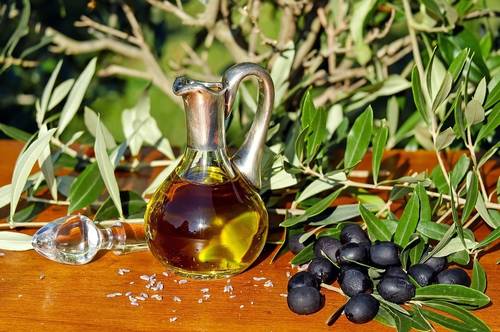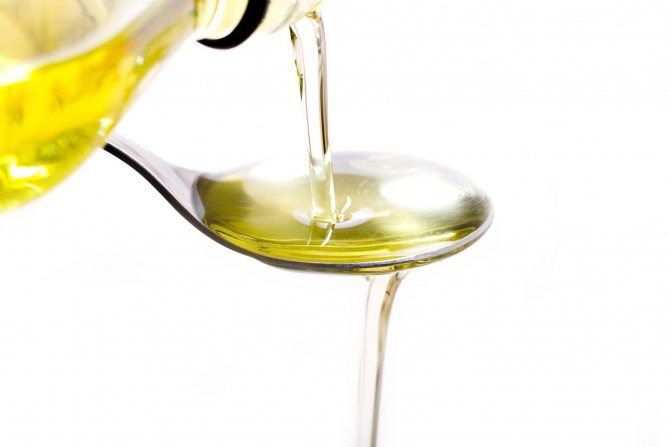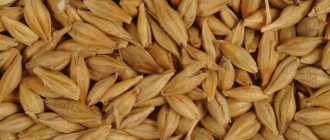Olive oil for the stomach: benefits, instructions for use
The oily product of the olive is considered “liquid gold”. The poet Homer called him that. Since ancient times it has been considered a valuable and useful product. It is known to have been used frequently in ancient Greece and Egypt to treat illnesses and in cooking. Currently, the fruits of the olive tree are used in cosmetology, as a prevention of diseases of the gastrointestinal tract, cancer, and heart disease. In cosmetology, face and hair masks, massage creams, and added to shampoos and balms are made from the fruits of the olive tree. They moisturize the skin well and strengthen the hair.
Traditional recipes for the treatment of gastritis
Pathologies of the gastrointestinal tract can be successfully treated at home. In complex therapy with medications, such measures will prevent the development of the disease in the future.
Let's look at some recipes.
Propolis and olive oil
A popular and effective remedy for the treatment of hyperacid gastritis in chronic form contains:
- pure propolis - 20 g;
- olive oil - 1 cup.
Rules for preparation and reception:
- Mix the ingredients and leave them in a water bath for about half an hour.
- Then strain the mixture and transfer it to a glass container, which should be stored in the refrigerator.
- Take the medicine on an empty stomach up to 5 times a day.

Olive and lemon
Lemon juice in combination with oil stimulates the glands and increases the level of hydrochloric acid in the hypoacid form of gastritis. To do this you will need:
- lemon - 2 pcs.;
- honey - 500 g;
- olive oil - 500 g.
How to prepare and take:
- Squeeze the juice from citrus fruits and mix with the remaining ingredients.
- Drink the medicine 30 minutes before meals, one teaspoon at a time.
- The course is 1 month.
Olive oil for prevention
If all medical recommendations are followed, any form of gastritis can be treated. But we should not forget about disease prevention. And the best recommendations for this are to use olive oil in everyday nutrition.
The extract is used fresh; it is not recommended to expose it to heat or hypothermia. The optimal storage temperature is 20-25 degrees in a dark place. At the same time, all biologically active substances that have a therapeutic effect are preserved.
The patient's nutrition should always be based on the principles of a healthy diet. During the acute period, a gentle diet is prescribed, which after a week is replenished with new approved products, including olive oil. It will protect the diseased organ during the period of mucosal regeneration.
Effect of oil on the body:
The olive product has many beneficial properties on the human body:
- Regulates the functioning of the gastrointestinal tract;
- Promotes the flow of bile;
- Reduces stomach acidity during heartburn;
- Has a healing effect;
- Prevents the formation of ulcers in the stomach;
- Reduces the risk of malignant tumors.
Olive oil has a laxative effect. Thanks to which impurities and toxins are removed from the body. The acids that olive contains prevent the formation of fatty deposits and cellulite.
Used as a prevention of atherosclerosis, as well as for improved liver function. Vitamin A in the composition will help strengthen vision.
Consumption of oils in food
A healthy person consumes various types of oils daily: butter, sunflower, and so on. However, sunflower oil for gastritis of the stomach should be added to a variety of dishes and diet only as prescribed by a specialist. And always combine with medications. Traditional medicine recommends a variety of oils to successfully combat the disease. And at the same time, without the support of medications, the expected result will not be achieved.
Our ancestors noticed the healing effect. The components included in the composition have an enveloping effect, relieve inflammation, and successfully fight bacteria. The result is that inflammation areas heal much faster.
In addition, the oil extracted from the seeds significantly improves the functioning of the heart muscle, allowing you to accumulate energy and improve immunity. It has been scientifically proven that the product reduces the risk of developing cancer and protects against asthma.
Among the most popular oils that doctors recommend using are pumpkin, olive, sea buckthorn, black cumin, and sunflower oils.
Labeling and manufacturers
Olive oil is divided into several categories depending on its processing. Marked as:
- Unrefined oils: Extra Virgin, Fine virgin, Semi fine virgin oil;
- Olive oil – refined.
Its most famous producers are Spain, Italy and Greece. These are the main suppliers of oil to the market. It is also produced in other countries where this tree grows, but not in such quantities that it can be sold to other countries. Unrefined oils are extracted by cold pressing. They contain more useful olive products, vitamins and microelements are preserved. Refined - extracted using heat treatment, due to which some of the beneficial substances are lost. This product is best used for frying.
Storage rules
After opening the container, it is recommended to use the oil as soon as possible, for example a month. If there is too much of it, it is recommended to store it in a warm and dark place. Avoid contact with sunlight and seal the bottle well.
Directions for use, contraindications
For sunflower oil to have a healing effect, you need to take it correctly. In the morning, 20 minutes before meals, take 1 tablespoon of the product and put it in your mouth. It is not swallowed, but slowly dissolved.
As for the contraindications for which doctors advise stopping use, they also exist. People with individual intolerance to the product should not use the oil. Those who suffer from diabetes also need to be extremely careful. After all, oil can increase sugar levels.
In addition, sunflower oil in large quantities significantly increases cholesterol levels. It can also cause the development of atherosclerosis in patients with type 2 diabetes.
Thus, sunflower oil can be used to treat gastritis. But this should be done only after a final diagnosis has been made and on the recommendation of the attending gastroenterologist.
Is it possible to use olive oil for gastritis?
This is a disease in which you must adhere to a strict diet. Eliminate fatty and junk foods from your diet. When the stomach is inflamed, olive oil envelops its walls and promotes the healing of wounds on its walls that form during attacks. It is recommended to take both for the prevention of gastrointestinal inflammation and for its treatment. Flaxseed oil has the same properties, but olive oil has a richer composition.
Types of gastritis:
The disease has two forms: acute and chronic. Divided into the following types:
- Spicy. Occurs when taking medications, overeating junk food;
- Erosive. An advanced form of the disease, which is caused by the development of the bacterium Helicobacter pylori.
- Chronic. Systematic manifestation of signs of the disease.
- Surface. It is weakly manifested, since it affects only the surface layer. Occurs when the body is weakened, overeating, fasting, or drinking alcohol.
- Gastritis with increased stomach acidity. Causes nausea, vomiting, problems with appetite, and frequent heartburn.
- Atrophic gastritis. There is reduced acidity in the stomach, resulting in inflammation, and stomach cells gradually die.
Reasons for the development of gastritis
The occurrence of the disease can be triggered by poor nutrition, taking medications, bad habits, regular consumption of spicy foods and the entry of the H. pylori bacterium into the intestines. This is how infectious gastritis develops. The bacteria enters the gastric mucosa, actively multiplies, and begins to prevail over beneficial bacteria. Gradually destroys the gastric mucosa, aggressive factors predominate, the gastric mucosa becomes inflamed, and in advanced forms, an ulcer forms. H. Pylori is an infectious factor in the development of gastric ulcers.
Symptoms of gastritis
Main signs of the disease:
- pain in the abdominal area: sharp, paroxysmal;
- nausea;
- heartburn;
- sour breath;
- constipation or diarrhea;
- decreased appetite;
- flatulence.
Some useful facts about sunflower oil
- If you eat two teaspoons of sunflower oil every morning on an empty stomach, you can permanently get rid of constipation and improve stool production.
- For abdominal pain and flatulence, a vegetable salad seasoned with vegetable oil (without tomatoes) will help.
- Sunflower oil is an excellent remedy for the beauty of your hair and youthful complexion; useful masks will help bring your look to perfection.
- What distinguishes vegetable oil from butter? Of course, the absence of cholesterol, which is so harmful to our body.
Is it worth drinking olive oil on an empty stomach? Are there any benefits?
Many doctors recommend consuming olive oil in the morning for health benefits. At this time, the body maximally absorbs all nutrients and beneficial substances.

The product cleanses cells and tissues of harmful substances throughout the day. It also improves skin condition, has a rejuvenating effect, and normalizes intestinal function. It is recommended to use it in a course: 1-2 months, then take a break for the same amount of time.
Pros of using it in the morning:
- normalizes blood pressure;
- envelops the intestinal walls;
- maintains facial skin tone;
- strengthens hair;
- improves mood;
- prevention for cancer.
The product is taken in the morning, 15-20 ml on an empty stomach. After 30 minutes they start having breakfast. The recommended dose should not be exceeded, as this may cause diarrhea. This product is used in sports nutrition. Promotes weight loss if taken no more than 15 ml per day.
There is an opinion about the uselessness of taking olive product on an empty stomach. It is believed that it does not bring any benefit to the body, and the content of useful substances in it is so small that it does not have a positive effect on the body.
About the benefits of olives and olives
Heat-loving olives grow only in southern countries.
Greece, Turkey, Tuscany, Israel and other countries in the Mediterranean, Middle East and North Africa have the largest olive tree plantations. In our country, olives are sold canned or cooked with vinegar, oil, and salt water. Olives produce very healthy and nutritious olive oil. Olive oil consists of 20% saturated and 80% unsaturated fatty acids, of which 10% are those acids that our body does not produce on its own, but receives only from food. This is why olive oil is considered a very valuable product.
Olives are distinguished by their high oil content, a biologically active complex of various fatty acids. The fruit, 2 cm in diameter, contains about 25% oil. Fatty acids are necessary for the cells of our body for the protective membranes and protective shells of mitochondria, in which energy is produced. With a deficiency of fatty acids, the number of mitochondria is reduced, which leads to a decrease in the viability of the body.
Under the influence of vegetable fats, tissues begin to produce the hormone prostaglandin E-1, which has an anti-inflammatory effect on our body and helps reduce pain syndromes, while fatty acids contained in meat (for example, arachidonic acid) provoke the production of the tissue hormone prostaglandin E-2 , which contributes to headaches, tumors, itching, inflammation, allergies, etc.
Olives contain vitamin E, which plays an important role in the functioning of all glands of our body, especially the thymus.
The biologically active complex contained in olives supplies our body with fatty acids and vitamin E necessary for normal functioning, which inhibits the aging process and helps strengthen the immune system. In addition, the biocomplex protects all glands that produce hormones, relieves pain caused by inflammatory processes, and helps to lose excess weight.
Olives are high in calories: approximately 73% of calories are contained in fatty acids alone. But, oddly enough, olives help you lose weight. This is because our body quickly becomes full when we consume even a small amount of fatty olives.
In case of chronic gastritis, eating canned olives is permissible only during the recovery period and in limited quantities. However, it will be very useful to add olive oil to various dishes, which will help replenish the lack of fatty acids in the body.
Olives are the same olives, as they grow on the same olive tree. Only in Russia is it customary to call green fruits olives, and black ones – olives. The difference in color is explained not by the fact that these are fruits of different ripeness, but by the processing technology. Only green ones are used for preservation, and black ones are used for oil production.
For preservation, the bitterness is removed from the collected fruits using caustic soda in special containers. After this, the fruits are separated: in order for them to turn black, they are treated in special vats with oxygen for a week. This procedure causes the fruits to turn black, makes them soft and gives them an original taste.
Olives contain a lot of useful substances, but patients with pancreatitis in the acute phase are not recommended to eat them, since the vegetable fats they contain overload the pancreas. The choleretic ability of olive oil can increase inflammation of the pancreas and cause the movement of stones in cholelithiasis, which usually accompanies pancreatitis.
- normalize cholesterol
- lower blood pressure
- help with constipation
- Thanks to the antioxidants it contains, they prevent the development of cancerous tumors.
Content
Every time we talk about olives and olives, we cannot help but note the benefits of another product, which, in this case, is a by-product. We are talking about olive oil; it is the fundamental element of the presented product.
For example, use this oil for two weeks, then take a week off.
Olives consumed for diabetes provide unique assistance to the functioning of the male body. In this regard, they are especially valued in the treatment of diabetics of this gender. Thus, experts have proven that if you follow the following rules, the benefits for the prostate gland will be invaluable:
- it is necessary to adhere to the schedule - every day;
- consume no more than 3-4 olives;
- It is permissible to do this together with olive oil.
How to eat black olives?
If the presented rules are followed, problems that have arisen in the functioning of the prostate gland will almost automatically be eliminated. To maintain the effect for a longer period of time, it is recommended to eat olives as often as possible.
As you know, diabetes affects many organs and glands; these delicacies will help restore their optimal functioning.
Considering that diabetics are forced to adhere to a more than strict diet, it is undesirable to consume olives in too large quantities. Because at excessively high dosages, even a drug is quite capable of turning out to be a potent poison.
This is the amount of product that will help the body function normally without any problems. It is also permissible to use them as one of the ingredients, for example, in salads, soups, hot dishes and other dishes for diabetes.
The temperature regime, in this case, should be maximum. The browned pieces are laid out on a plate. After this, you don’t have to wash the frying pan, but pour the pre-chopped onion into it and fry it until a golden hue appears. In this case, you need to stir frequently and do this for about four minutes.
The next step is to add tomatoes, which it is recommended to continue cooking without leaving the burner. Then the broth is poured in and the chicken is placed back in the pan. This entire mass is brought to a maximum boil, after which the heat is reduced. It is advisable to simmer under the lid over low heat for about 40-50 minutes.
Now the dish can be considered completely ready. It is served warm, without adding bread or any side dishes. However, a small amount of fresh vegetables will not be superfluous.
Olive oil for erosive gastritis
The erosive form of the disease occurs when digestive acid produced by the walls of the stomach damages its surface tissues. First of all, the gastric mucosa is affected, then the smooth muscles. This is an advanced form of gastritis. If you do not treat the erosive form of the disease, this will lead to the formation of ulcers.
This disease requires medical intervention and proper treatment. Olive oil product can be taken in combination with the main treatment. This product will enrich the body with useful substances, relieve pain during an attack, and partially restore the tissue of the mucous membrane. Will speed up the wound healing process.
You need to know how to take olive oil for gastritis correctly: it is recommended to take 1 tablespoon 3 times a day before meals. After taking, drink with a small amount of water. You can eat food after 30 minutes.
How to treat?
For gastritis, it is effective to take olive oil half an hour before meals; one tablespoon three times a day. You should not consume sunflower oil in such doses, which can cause hepatic colic. As for olive, there is no danger. In addition, increased or decreased secretory function will not be a contraindication to the use of this product. It will improve the functioning of the pancreas and liver, have a beneficial effect on the intestines, and accelerate the healing of ulcers in the stomach or duodenum.
Before drinking olive oil in the morning, it is useful to drink some plain still water. Thanks to this, the organs of the digestive system will prepare for work.
Of course, you need to choose fresh oil for treatment. There should be no sediment, nor should there be a bitter taste. It is best to choose olive oil that was produced no more than a month ago at the time of purchase. Some people cannot consume pure oil. In this case, you can add it to porridge or other ready-made dishes.
To achieve the effect, it is recommended to take the oil for two months . The condition may improve in the first weeks, but you should not stop the course. To prevent relapses, you need to drink olive oil for the entire specified period. Then take a short break, after which repeat the two-month course. Sometimes gastritis is accompanied by constipation. The same olive oil will come to the rescue in the fight against this uncomfortable phenomenon.
To get rid of fecal stones and constipation, you need to do an enema : warm water, egg yolk and olive oil.
If in the morning after taking a spoonful of oil you drink a glass of warm boiled water with lemon (a few drops of lemon juice), this will have a mild laxative effect. After this procedure, you need to lie down for 15 minutes.
Treatment of gastritis with olive oil
Olive oil for the treatment of gastritis is consumed three times a day, 1 tbsp. Before taking, drink a few sips of boiled water. The product has no side effects.
It can be used for inflammation of the stomach with high and low acidity, erosive form, stomach ulcers and other diseases of the gastrointestinal tract. Helps restore intestinal function and heal damaged tissue.
In advanced forms of the disease, it is recommended to first consult with a doctor so that he can adjust the dosage and monitor the result.
Important! Olive oil for gastritis is not the main cure. If problems arise with the gastrointestinal tract, it is recommended to coordinate any actions with your doctor.
How to choose oil for the treatment of gastritis
Before starting treatment for stomach diseases, you should figure out which product is best to choose. The main parameter is acidity. To treat intestinal diseases, use a product with an acidity of at least 0.5%. This percentage is obtained by cold or first pressing, which allows you to preserve all the beneficial substances. The label must be marked "Extra Virgin". It is not recommended to use second-press oils for stomach inflammation. They are used for frying and have a high percentage of acidity.
Particular attention should be paid to the container in which the product is sold. It is better to buy it in a glass bottle rather than a plastic one. This bottle protects the contents from sunlight and air getting inside. Please check the release date before purchasing. The later it was made, the more useful substances it contains.
Contraindications
Olive oil has many beneficial properties due to its high oleic acid content. If you consume the olive product in unlimited quantities, there will be too much oleic acid in the body, and its effect will be the opposite. The acid has a choleretic effect. With excess consumption, the secretion of bile will increase, which will sharply increase the tone of the gallbladder. If there are stones in the bladder, the bile will move them out of place and the duct into the duodenum will be pinched.
It is prohibited to use:
- Contraindicated for cholecystitis.
- If you are allergic to olive, you must avoid it completely. May cause a serious allergic reaction: swelling, itching, rash. In rare cases, anaphylactic shock.
- The olive product should not be consumed in unlimited quantities. It is high in calories and may contribute to obesity.
This product is widely used in cooking, has medicinal properties, and normalizes the functioning of the gastrointestinal tract. According to reviews of women who consumed the olive product to treat diseases of the gastrointestinal tract and improve the condition of the body, we can say that the oil envelops the stomach, eliminates pain during an attack of illness, and restores the intestinal walls. In addition to its effect on the intestines, it rejuvenates the skin, strengthens hair and nails. After taking 1 tbsp of olive oil, the body is saturated for a long time, thanks to its calorie content.
The nuances of eating pancakes
A more than suitable dosage would be one dessert spoon of butter and two or three olives, but no more.
Usually, when asked whether it is possible to eat pancakes with gastritis, doctors answer with a cautious “no.” The fact is that cooked in the traditional way, in a frying pan, they will be difficult to digest, and therefore can cause an exacerbation of the disease.
In addition, pancakes are prohibited for patients who have a certain form of the disease accompanied by high acidity.
With this form of inflammation, any baked or fried foods prepared using fermented milk products and vegetable oil are generally excluded.
Doctors allow pancakes as one of the main dishes at the stage when the exacerbation has passed and systemic treatment of inflammation has begun. If gastritis relapses, products from heat-treated dough are excluded, except for crackers and diet bread.










